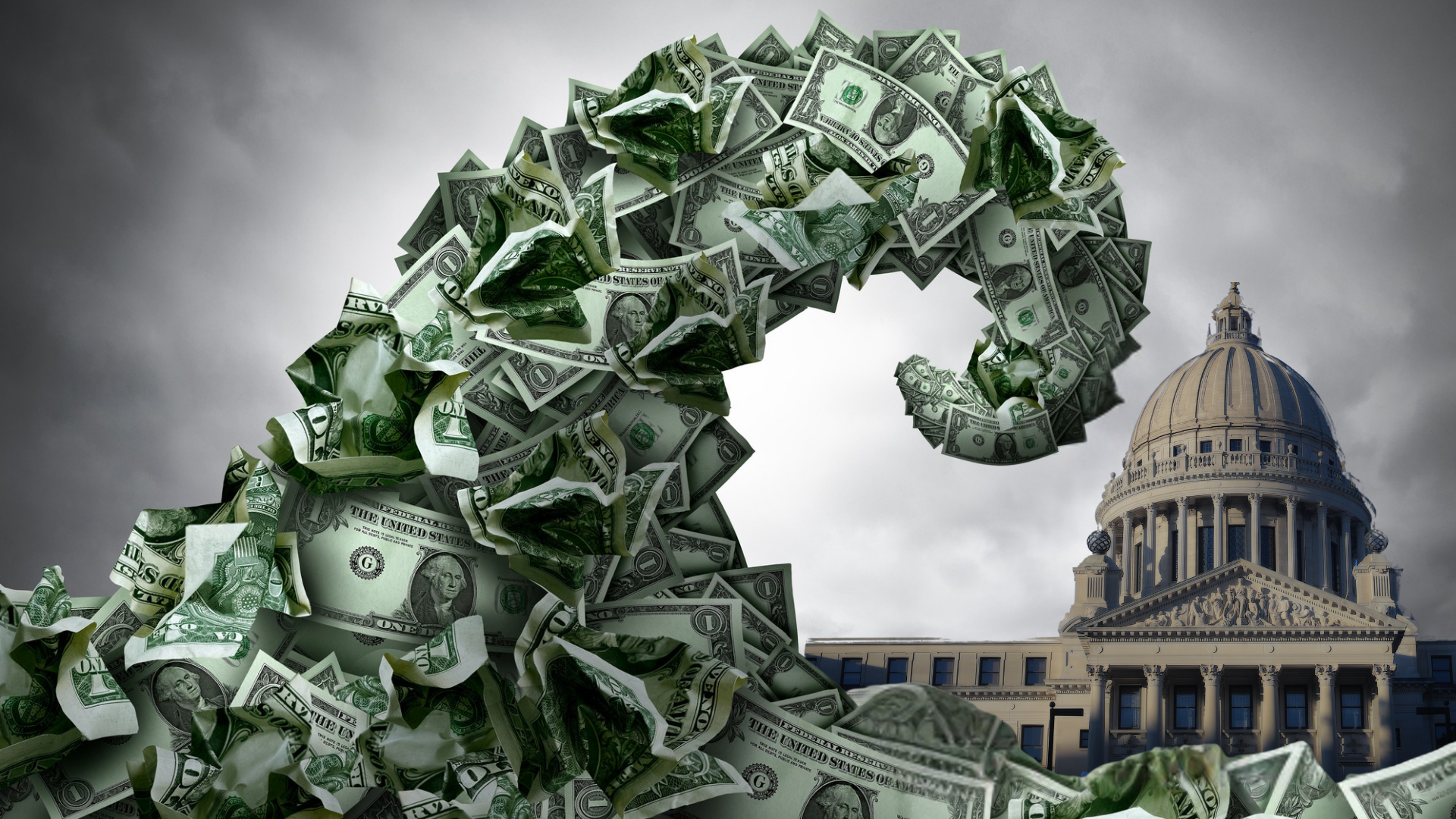The House Finance Committee is holding a public hearing this morning at 8 a.m. on a proposed $3 billion tax increase bill (HB 2186). House leaders remain adamant that their proposed capital gains tax is an excise tax and not an income tax despite the bill defining capital gains as the gain reported to the Federal IRS for income tax purposes. With that in mind here are several questions I hope get clarified at today's hearing:
- The Supreme Court has ordered the state to provide a “dependable and regular” funding source for basic education. Are capital gains taxes “dependable and regular” or are they “extremely volatile?”
- Background: (DOR) analysis of an earlier capital gains tax income bill (House Bill 2563 in 2012) agreed that capital gains are highly volatile saying: “Capital gains are extremely volatile from year to year. Revenue from this proposal will depend entirely on fluctuations in the financial markets and can be expected to vary greatly from the amounts presented here.”
- Also see: California’s Legislative Budget Office (LAO) says about capital gains: "Probably the single most direct way to limit the state’s exposure to the kind of extreme revenue volatility experienced in the past decade would be to reduce its dependence on the source of income that produced the greatest portion of this revenue volatility—namely, capital gains and perhaps stock options."
- Background: (DOR) analysis of an earlier capital gains tax income bill (House Bill 2563 in 2012) agreed that capital gains are highly volatile saying: “Capital gains are extremely volatile from year to year. Revenue from this proposal will depend entirely on fluctuations in the financial markets and can be expected to vary greatly from the amounts presented here.”
- Is the capital gains tax proposed by HB 2186 designed to avoid the volatility problems that other states (like California) have attempted to correct for by reducing reliance on capital gains taxes for ongoing spending?
- Background: California lawmakers and voters in 2014 approved a constitutional amendment reducing the state's reliance on volatile capital gains. Explaining the impact of the constitutional amendment the LAO said: "This constitutional amendment separates state spending from the rollercoaster of revenue volatility. This measure takes capital gains revenues that make up more than 8% of the General Fund - the average for the last 10 years - off the table rather than being used for unsustainable permanent tax cuts or ongoing programs."
- Background: California lawmakers and voters in 2014 approved a constitutional amendment reducing the state's reliance on volatile capital gains. Explaining the impact of the constitutional amendment the LAO said: "This constitutional amendment separates state spending from the rollercoaster of revenue volatility. This measure takes capital gains revenues that make up more than 8% of the General Fund - the average for the last 10 years - off the table rather than being used for unsustainable permanent tax cuts or ongoing programs."
- Does the proposed capital gains tax apply to transactions (like the REET tax) or does it instead apply only to the income gain reported for federal income tax purposes? What is the definition of capital gain in the bill?
- Background: House tax bill (HB 2186) itself defines capital gains: "'Adjusted capital gain' means federal net long-term capital gain . . . 'Federal net long-term capital gain' means the net long-term capital gain reportable for federal income tax purposes."
- In fact, a different section of HB 2186 requires those subject to the new capital gains tax to send a copy of their federal income tax return to the state: "taxpayers owing tax under this chapter must file with the department on or before the date the federal return is required to be filed a copy of the federal income tax return along with all schedules and supporting documentation."
- Background: House tax bill (HB 2186) itself defines capital gains: "'Adjusted capital gain' means federal net long-term capital gain . . . 'Federal net long-term capital gain' means the net long-term capital gain reportable for federal income tax purposes."
- Are there examples of excise taxes that don’t apply to transactional price but instead only to the income realized from the transaction?
- Background: A tax expert at the Tax Foundation provided this analysis of HB 2186: “The idea is that it's an excise tax on the sale of capital asset, not an income tax on proceeds. But that's not how excise taxes work. If a capital gains tax was an excise tax, we would expect it to fall on the entire sales price (or flat per sale), not just net gain. We'd also expect it to fall on each transaction separately, not on the aggregate of capital gains and losses as reported on form 1040. Plus, although excise taxes are often paid by seller (tax stamps), economic incidence is borne by consumer. That's not the case here. The seller of a capital asset pays out of her income. Tax isn't embedded in transaction. It doesn't function like an excise tax at all. It's telling that taxpayers would have to submit their federal 1040 to report Washington capital gains. What excise tax works that way? 41 states tax capital gains -- all in their 'income taxes.' Federal gov't also taxes as income. Hard to argue WA cap gains different. If it looks and acts like a tax on a class of income (cap gains), it probably is."
- Background: A tax expert at the Tax Foundation provided this analysis of HB 2186: “The idea is that it's an excise tax on the sale of capital asset, not an income tax on proceeds. But that's not how excise taxes work. If a capital gains tax was an excise tax, we would expect it to fall on the entire sales price (or flat per sale), not just net gain. We'd also expect it to fall on each transaction separately, not on the aggregate of capital gains and losses as reported on form 1040. Plus, although excise taxes are often paid by seller (tax stamps), economic incidence is borne by consumer. That's not the case here. The seller of a capital asset pays out of her income. Tax isn't embedded in transaction. It doesn't function like an excise tax at all. It's telling that taxpayers would have to submit their federal 1040 to report Washington capital gains. What excise tax works that way? 41 states tax capital gains -- all in their 'income taxes.' Federal gov't also taxes as income. Hard to argue WA cap gains different. If it looks and acts like a tax on a class of income (cap gains), it probably is."
- Do the 41 states with capital gains taxes tax them as excise taxes or income taxes? Do any of the 9 states without capital gains taxes have income taxes?
- Background: Per the Tax Foundation: “Forty-one states tax capital gains income. In all cases, it is captured by the state’s individual income tax and not by a discrete tax on capital gains. Indeed, all states currently treat capital gains as income. Proposals to label a Washington tax as an excise on buying and selling stock, designed to elide constitutional restrictions, fall apart when one considers that the 'excise' is imposed on realized gains less losses (that is, income), and not on total share value or financial transactions.”
- Background: Per the Tax Foundation: “Forty-one states tax capital gains income. In all cases, it is captured by the state’s individual income tax and not by a discrete tax on capital gains. Indeed, all states currently treat capital gains as income. Proposals to label a Washington tax as an excise on buying and selling stock, designed to elide constitutional restrictions, fall apart when one considers that the 'excise' is imposed on realized gains less losses (that is, income), and not on total share value or financial transactions.”
- Have the prior Supreme Court rulings prohibiting the legislature from calling an income tax an excise tax been overturned?
- Background: On the issue of the Legislature trying to call an income tax an “excise tax” to pass constitutional muster, former Supreme Court Justice Talmadge highlights the decision in Jensen v. Henneford: "The Legislature attempted to describe the income tax as an excise tax on the ‘privilege of receiving income’ in the State of Washington. The Supreme Court was unmoved. The Jensen court stated that the 1935 Legislature’s effort to rename the tax did not make it an excise tax . . . Subsequently, in Power, Inc v. Huntley, the Legislature enacted what it described as a corporate excise tax, which was actually a graduated new income tax on corporations. Again, the Supreme Court indicated that legislative labels for a tax are not controlling."
- Background: On the issue of the Legislature trying to call an income tax an “excise tax” to pass constitutional muster, former Supreme Court Justice Talmadge highlights the decision in Jensen v. Henneford: "The Legislature attempted to describe the income tax as an excise tax on the ‘privilege of receiving income’ in the State of Washington. The Supreme Court was unmoved. The Jensen court stated that the 1935 Legislature’s effort to rename the tax did not make it an excise tax . . . Subsequently, in Power, Inc v. Huntley, the Legislature enacted what it described as a corporate excise tax, which was actually a graduated new income tax on corporations. Again, the Supreme Court indicated that legislative labels for a tax are not controlling."
- If the capital gains tax is enacted is litigation still expected to determine its constitutionality?
- Background: Lawmakers were warned in a fiscal note for a prior capital gains proposal that: "We assume that because the capital gains tax is a new tax actions challenging its constitutionality will be filed in Superior Court . . . We assume up to five Superior Court actions will be filed challenging the constitutionality of the capital gains tax and that such court challenges will be filed after the effective date of the capital gains tax . . ."
Additional Information
Capital gains taxes are too unreliable to fund education
Bills would impose a capital gains income tax in Washington state





